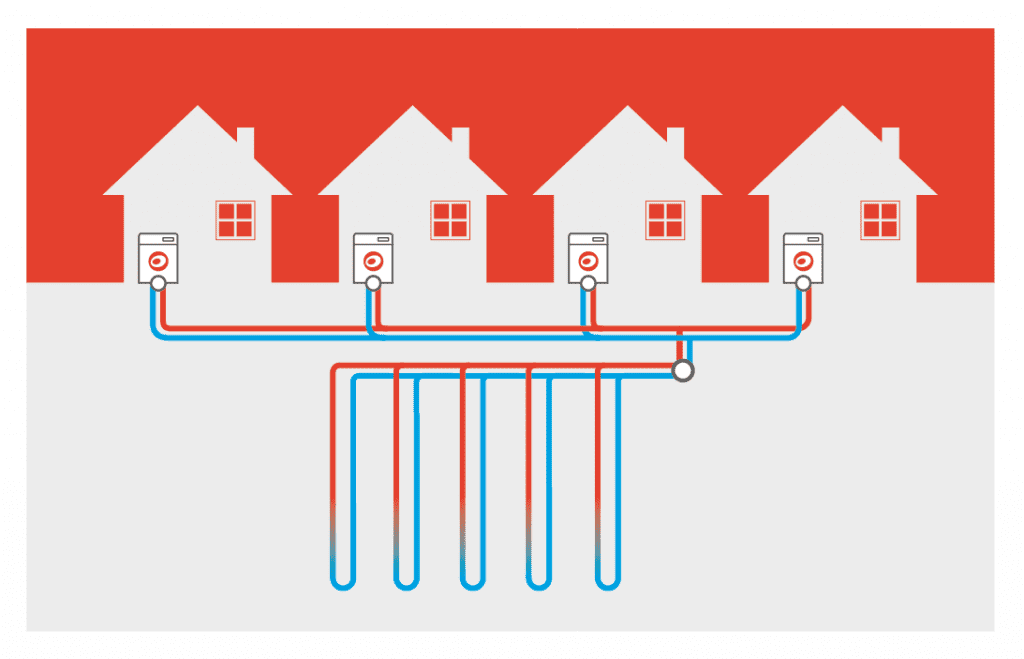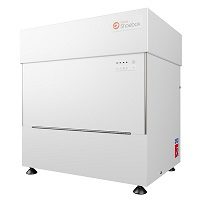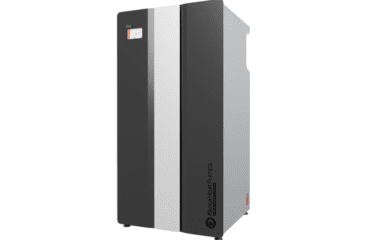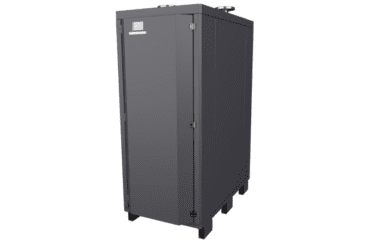Delivering retrofit ground source heat pump installations at scale is key to achieving our carbon reduction targets – 80% of the building stock that will exist in the UK in 2050 has already been built. By engaging the rented and owner-occupier sector to deliver community-wide ‘heat the street’ schemes, Kensa is future-proofing our buildings of yesteryear.

Approach
Kensa’s philosophy for retrofit private housing heating upgrades is for a street-by-street, area-by-area basis, rather than house-by-house. This approach has significant benefits, including:
Working in areas of a single decision-maker, i.e. privately owned blocks of flats and estates, Kensa’s approach ensures government subsidy can allow large numbers of people to connect at the same time.
Kensa’s innovative Shared Ground Loop Arrays link a series of boreholes to multiple properties, including flats, via an ambient temperature distribution system.
Each property then has an individual Kensa heat pump wired to their own electricity supply, which upgrades the low temperature ground heat for heating and hot water within their dwelling.

read more
The advantages of Shared Ground Loop Arrays in retrofits:
- Exempt from Heat Network Metering & Billing Regulations.
- Extremely low CO2 emissions;
- Easy carbon & building regulations compliance.
- No NOx, SOx or particulates emissions.
- Lowest energy bills – slightly lower than mains gas, significantly lower than air source heat pumps, LPG & oil.
- Householders able to switch energy suppliers.
- No district heat losses.
- Potential for free summer cooling.
- Scalable and flexible district size can be deployed in sections as the development progresses.
- Ultra-efficient and reliable.
Products

The Kensa Shoebox Series
- Suited to flats and apartments and smaller houses
- Available in 3 – 6kW
Learn more

The Kensa Evo Series
- Ideal for medium to large homes
- Available in 7, 9, 13, 15 & 17kW
Learn more

The Kensa Q Series
- Ideal for large or commercial buildings
- 3 phase modular units to match high heat demands
Learn more
Properties featuring Kensa’s Shared Ground Loop Arrays will provide end users with numerous unique benefits over traditional Heat Networks:
Lower fuel bills
GSHP’s produce 3-4kWh of heat energy for every 1kWh of electrical energy used, making them 300-400% efficient. Compare this to a typical boiler, which is just 90% efficient. Kensa’s ground source heat pump systems offer the lowest fuel costs.
Lower emissions
Because a GSHP extracts so much “free” energy from the environment, this enables CO2 emissions to be lower than any other type of heating system.
Minimal maintenance
GSHPs don’t require annual servicing or maintenance, and have an expected lifetime of 20 years.
Energy independence
With an individual ground source heat pump in each property, homeowners are in complete control of their own heating and energy bills, enabling easy energy tariff switching and payment only for their own heat consumption.
DOWNLOAD PURCHASER'S GUIDE

Free cooling & no overheating
With heat being generated at the point of use (inside each dwelling) the ‘heat’ circulating the property is low temperature, therefore there are no heat losses from the system to contribute to overheating in risers and corridors. The low temperature system also allows for free passive cooling to be introduced, creating a comfortable living environment all year round.
Year round supply
1m below the surface the ground temperature remains a fairly constant 8-10°C all year round, ensuring your heat supply is constant and reliable; unlike air source heat pumps, which are impacted by external fluctuating air temperatures causing higher bills when heat is most needed.










